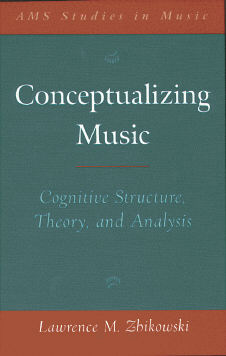from Oxford University Press
Conceptualizing Music:
Cognitive Structure, Theory, and Analysis
Lawrence M. Zbikowski
winner of the Society for Music Theory's 2004 Wallace Berry Award
recognized as a University Press Bestseller in January 2003 by the online journal Academia
 from the jacket copy for the book:
from the jacket copy for the book:
Music theory is often seen as an arcane and somewhat forbidding discipline which stands at a distance from the sweet pleasure and sensuous thrill that is music. Theory, according to this view, is concerned with scales and chords and intervals, or with complicated and highly abstract systems of musical relationships. It is not concerned with how music captivates us. But Lawrence Zbikowski argues that this common view of music theory is wrong. Theorizing about music is something we do every time we try to make sense of our musical experience, and involves the same cognitive capacities we use to make sense of the world as a whole. The play of concepts and conceptual structures typical of music theory is thus not something remote from our appreciation of music, but is instead basic to it.
In Conceptualizing Music: Cognitive Structure, Theory and Analysis, Zbikowski draws on recent research in cognitive psychology, cognitive linguistics, and artificial intelligence research to show how we employ basic cognitive capacities for the understanding of music. The theories of music that result range from the informal to the highly complex, but all make use of the same cognitive processes to give an account of musical structure. In the first part of the book Zbikowski provides an overview of recent research in cognitive science, and shows the roles categorization, cross-domain mapping, and conceptual models play in musical understanding. Each discussion is framed around specific musical topics, such as motivic transformation, text painting, and the ways in which we structure our understanding of a specific musical domain. In the second part of the book he presents analytical studies of specific musical issues, illustrated with discussions of a diverse repertoire that ranges from string quartets by Mozart and Beethoven, to songs by Schubert and Brahms, to George Gershwin’s "I Got Rhythm." Through these analyses he engages such topics as the relationship between processes of categorization and musical syntax, the problem of musical ontology, text-music relations, and conceptions of musical form and musical hierarchy.
The first application of research in cognitive science to the sort of problems with which music theorists and other humanistic scholars of music are usually engaged, Conceptualizing Music offers important insights for musicologists and ethnomusicologists as well as for music theorists, and presents a significant step in the exploration of connections between the study of cognition and the study of art.
The 2004 Wallace Berry Award
The Wallace Berry Award of the Society for Music Theory is given annually for a distinguished book by an author of any age or career stage. The citation for the award reads as follows:
This year's winner affords us a fresh experience of our field by making connections to areas all too often considered tangential. Grounding its investigations in the general cognitive capacities that we use to structure our understanding of the everyday world, the book ranges widely over many domains of musical activities and moves deftly between the music itself and our theorizing about it. Along the way, the author treats time-honored philosophical problems in new terms, examining cultural knowledge and the ontology of the musical artwork and exploring the negotiation of differences arising from various intellectual orientations. In the process, we are moved to grapple with the ways in which theory is not so much contingent upon music as it is integral to our concepts of it. The author's good-natured curiosity conveys an enthusiasm for music and music theory that will no doubt inspire and motivate others to continue broadening our conceptual horizons. The Wallace Berry Award is given to Larry Zbikowski for his book, Conceptualizing Music: Cognitive Structure, Theory and Analysis.
Reviews:
Wilfried Gruhn, "Musik und Kognitionswissenschaft," Musik & Ästhetik vol. 7, no. 27 (July 2003), pp. 111-113.
Emilios Cambouropoulos, Music Perception vol. 21, no. 1 (Fall 2003), pp. 135-153.
Michael Spitzer, Musicae Scientiae vol. 8, no. 2 (Spring 2004), pp. 283-296.
Ordering information:
Price: $50.00
360 pp.; 39 line illus, 60 music exx. & 3 tables; 6-1/8 x 9-1/4
ISBN: 0-19-514023-0
Link to Oxford University Press’s page for Conceptualizing Music.
Errata:
There are always possibilities for errors to creep into books, and Conceptualizing Music is no exception. Listed here are the errors of which I am aware thus far:
- p. 6, in the discussion of the Greater Perfect System, the examples given for diatonic pitches in the tetrachord hypaton are incorrect. The passage should read "for instance, Parhypate hypaton in the diatonic genus would be equivalent to Eb3, and Lichanos hypaton would be equivalent to F3."
- p. 132, in the second paragraph from the bottom of the page, the second to last sentence should read "Here the goal is not so much to explain everything about musical organization, but rather what is important in musical organization."
- p. 139, fn. 6, and p. 335 in the bibliography: On the sublime is traditionally attributed to Longinus, although the real author is not known. The only reason Aristotle is associated with the work (as it is in my incorrect citation) is that in the Loeb library On the sublime is bound together with Aristotle's Poetics (a confusing situation that led to this error). My thanks to Wendy Allanbrook for bringing this to my attention.
- p. 302, fn. 46, and p. 349 in the bibliography: Professor Spitzer's first name is Michael, not Mark (as it is given here).
I would be grateful for notification of other errors; readers may contact me at the email address given on my home page.